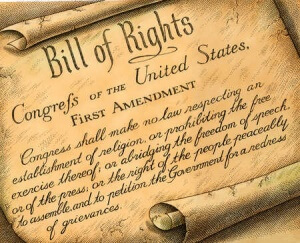21st Century Constitution and Religious Tests
May 7th, 2016

The Constitution of the United States of America is fairly straightforward regarding freedom of religion and religious tests.
The Constitution of the United States of America is fairly straightforward regarding freedom of religion and religious tests. This is especially true when you consider the fact that it was written over 200 years ago by men who had no idea what life in the USA would be like in 2016. Yet their words and concepts have been adapted over time to meet the myriad challenges that have faced this country and keep our idea of the rule of law intact. Some argue that it is the Constitution that has allowed our country to be as successful as it has been. While there have been some periods of darkness among the successful light, no group of individuals working together toward a common goal does so without struggle. There is still so much that can be learned from the study of the Constitution. Whether that study focuses on the text, the founders’ writings surrounding its penning, or on the legal path that constitutional law has come through the years, it is fascinating that more can still be learned.
Religious Tests
Religion is discussed in two places in the Constitution. The first place, in Article VI, states that “no religious test shall ever be required” as a qualification to hold federal public office. The second, and arguably more potent is within the text of the First Amendment, which was passed in 1789. The First Amendment states that “Congress shall make no law respecting an establishment of religion, or prohibiting the free exercise thereof,” in its first two clauses. What many people may not realize, however, is that when the First Amendment was adopted, it was met with a significant amount of skepticism from those citizens who believed our nation should be a Christian one. Some opponents believed that the country, through this Amendment, was turning its back on God. This led many states to continue to use religious tests as a way of ensuring that their public officials swore allegiance to a Supreme Being and shared their religious belief systems.
These tests were written into many states’ laws, and were enforced to prevent anyone who refused to swear an oath from holding public office. Eight states currently still have requirements for applicants to public office to pass a religious test written into their constitutions, and arguably, could attempt to enforce their use. This is because Article VI, where the “no test” provision is found, has not specifically been held to apply to the states, unlike the provisions of the First Amendment, which were long ago held to bind the states. In modern times, while possible, it is highly unlikely that any state will actually attempt to enforce the religious test provision of their constitution as the Supreme Court has explained in its First Amendment rulings that “neither a State nor the Federal Government can constitutionally force a person to profess a belief or disbelief in any religion.” This particular ruling did not address the applicability of Article VI to the states, but does provide a rather strong argument that such testing requirements would likely be found to be unconstitutional if enforced.
The study of religion in the constitution is full of surprises, even after years of study. Further, the law is constantly shifting as new interpretations come to light to handle the many varying situations that arise in American jurisprudence. The Universal Life Church will continue to monitor changes to the law, especially as they affect religious freedom, to ensure that all people have access to an understanding of the law in this most important protective role.


